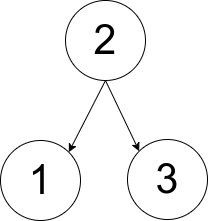1719. Number Of Ways To Reconstruct A Tree
Description
You are given an array pairs, where pairs[i] = [xi, yi], and:
- There are no duplicates.
xi < yi
Let ways be the number of rooted trees that satisfy the following conditions:
- The tree consists of nodes whose values appeared in
pairs. - A pair
[xi, yi]exists inpairsif and only ifxiis an ancestor ofyioryiis an ancestor ofxi. - Note: the tree does not have to be a binary tree.
Two ways are considered to be different if there is at least one node that has different parents in both ways.
Return:
0ifways == 01ifways == 12ifways > 1
A rooted tree is a tree that has a single root node, and all edges are oriented to be outgoing from the root.
An ancestor of a node is any node on the path from the root to that node (excluding the node itself). The root has no ancestors.
Example 1:

Input: pairs = [[1,2],[2,3]] Output: 1 Explanation: There is exactly one valid rooted tree, which is shown in the above figure.
Example 2:

Input: pairs = [[1,2],[2,3],[1,3]] Output: 2 Explanation: There are multiple valid rooted trees. Three of them are shown in the above figures.
Example 3:
Input: pairs = [[1,2],[2,3],[2,4],[1,5]] Output: 0 Explanation: There are no valid rooted trees.
Constraints:
1 <= pairs.length <= 1051 <= xi < yi <= 500- The elements in
pairsare unique.
Solutions
Solution: Depth-First Search
- Time complexity: O(n+m2logm)
- Space complexity: O(m2)
JavaScript
js
/**
* @param {number[][]} pairs
* @return {number}
*/
const checkWays = function (pairs) {
const graph = new Map();
for (const [x, y] of pairs) {
if (!graph.has(x)) graph.set(x, []);
if (!graph.has(y)) graph.set(y, []);
graph.get(x).push(y);
graph.get(y).push(x);
}
const m = Math.max(...graph.keys());
const indegree = Array.from({ length: m + 1 }, () => 0);
const connected = Array.from({ length: m + 1 }, () => {
return Array.from({ length: m + 1 }, () => false);
});
for (const [x, y] of pairs) {
indegree[x] += 1;
indegree[y] += 1;
connected[x][y] = true;
connected[y][x] = true;
}
const root = indegree.indexOf(graph.size - 1);
if (root === -1) return 0;
const visited = Array.from({ length: m + 1 }, () => false);
const ancestors = [];
let multipleWays = false;
for (const nodes of graph.values()) {
nodes.sort((a, b) => indegree[b] - indegree[a]);
}
const isReconstructTree = node => {
const isConnected = ancestors.every(ancestor => connected[ancestor][node]);
visited[node] = true;
if (!isConnected) return false;
ancestors.push(node);
for (const neighbor of graph.get(node)) {
if (visited[neighbor]) continue;
if (indegree[node] === indegree[neighbor]) {
multipleWays = true;
}
if (!isReconstructTree(neighbor)) return false;
}
ancestors.pop();
return true;
};
if (!isReconstructTree(root)) return 0;
return multipleWays ? 2 : 1;
};